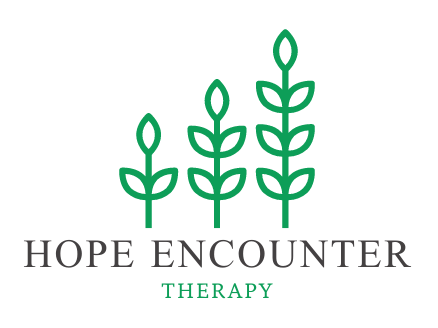There is Hope for Healing
Every day, we work with some of the bravest individuals on the planet, though you may not realize it when you first walk through the door. Many of you feel defeated, overwhelmed, and ashamed. You wonder, “Why can’t I just ‘get over’ my sexual, physical, or emotional trauma?” “Why do past betrayals, loss, and marital challenges continue to impact my ability to connect with my spouse?”
It’s also common to experience a persistent feeling that something is not right—unhappiness, feeling unloved or unlovable, disconnection from friends and family, and a lack of purpose or direction. These symptoms may indicate that past trauma, long dismissed, minimized, or buried, needs to be addressed.
At Hope Encounter Therapy, we believe there is hope for healing from trauma for every individual and relationship committed to doing the hard work of therapy. Our primary model for addressing individual and shared trauma is EMDR. Our clients’ significant healing through this proven technique continues to validate our belief in its effectiveness.

The Benefits of EMDR Therapy
Eye Movement Desensitization and Reprocessing (EMDR) is a highly effective therapy for individuals and couples dealing with trauma, anxiety, and emotional distress. It helps process unresolved memories and negative beliefs that may be causing distress, promoting emotional healing. By using guided eye movements or other bilateral stimulation, EMDR facilitates the brain’s natural ability to reprocess traumatic experiences, reducing their emotional intensity.
There are many benefits of EMDR:
Trauma Healing:
EMDR is especially effective for trauma recovery. It helps clients process and reframe traumatic memories that are often stored in the brain in a fragmented, distressing way. Through bilateral stimulation (e.g., eye movements or tapping), EMDR reactivates the brain’s natural processing system, allowing traumatic memories to be stored in a less emotionally charged manner.
Reduced Emotional Distress:
By reprocessing painful memories, EMDR helps reduce the emotional intensity associated with those memories. Clients often experience significant relief after just a few sessions, as distressing thoughts, feelings, and body sensations are minimized.
Improved Emotional Regulation:
EMDR helps clients develop healthier coping mechanisms and emotional resilience. It enables individuals to process emotions more effectively, leading to greater emotional stability and the ability to handle life stressors with greater ease.
Enhanced Relationships:
For individuals and couples, EMDR can help address relationship trauma and emotional wounds. By healing past hurts, improving trust, and fostering healthier communication, EMDR facilitates deeper emotional connections and intimacy.
Faster Results:
Compared to traditional talk therapy, EMDR often produces quicker results. The intensive nature of the therapy helps clients process multiple traumatic memories in a shorter timeframe, offering a more efficient healing process.
Replaced Negative Beliefs:
EMDR helps individuals identify and replace self-limiting beliefs (e.g., “I am unworthy” or “I am unsafe”) with healthier, empowering ones, boosting self-esteem and confidence.
Overall, EMDR is a transformative approach that fosters personal growth, emotional regulation, and healthier relationships, making it a valuable tool for both individual and relational healing.
Symptoms of Unresolved Trauma
(sometimes called PTSD or C-PTSD)
It’s completely understandable to feel overwhelmed by painful memories or emotions that seem impossible to shake. You’re not alone in this, and it’s okay to seek support. EMDR can be a powerful tool to help you process those experiences, giving you relief from the weight you’ve been carrying. It’s not about forgetting what happened but about finding a way to heal, so those memories no longer control your present. You deserve to feel safe, grounded, and free from the past. Reaching out for help is a brave step, and it shows your strength and desire for healing.
Trauma Symptoms
Trauma symptoms can have a profound and long-lasting impact on an individual’s mental, emotional, and physical well-being. These symptoms often manifest as a result of experiencing or witnessing a distressing event, such as abuse, loss, or violence. In the short term, trauma can lead to shock, confusion, and overwhelming emotional reactions. Over time, however, these symptoms can evolve into chronic issues that affect various aspects of a person’s life.
Common trauma symptoms include anxiety, depression, flashbacks, nightmares, and hypervigilance. Individuals may struggle with feelings of numbness or detachment, making it difficult to connect with others or experience joy. Relationships can suffer as trauma often triggers trust issues, communication problems, and emotional withdrawal.
Physically, trauma can lead to chronic health conditions such as insomnia, headaches, gastrointestinal issues, and even autoimmune disorders. People with unresolved trauma may also engage in unhealthy coping mechanisms, such as substance abuse or self-harm, in an attempt to numb emotional pain.
The impact of trauma can disrupt a person’s ability to function in daily life, impacting work, social interactions, and overall quality of life. Without healing, trauma symptoms can become ingrained, leading to long-term psychological difficulties. Addressing trauma with appropriate therapy, such as EMDR, is crucial for restoring emotional balance and fostering healing.
Here’s an extensive list of the symptoms you may be experiencing:
Emotional Symptoms:
– Anxiety
– Depression
– Chronic sadness or hopelessness
– Persistent feelings of fear, panic, or hyper-vigilance
– Feelings of numbness or detachment
– Difficulty concentrating
– Memory problems
Behavioral Symptoms:
– Substance abuse
– Self-harm
– Social withdrawal or isolation
– Avoiding relationships or activities that were previously enjoyed
– People-pleasing behaviors
Physical Symptoms:
– Headaches
– Fatigue
– Unexplained pain
– Cardiovascular issues such as high blood pressure, stroke, or heart attacks
– Chronic pain in various parts of the body
Intrusive Thoughts and Flashbacks:
– Vivid and distressing memories of the traumatic event, which can be triggered by specific sights, sounds, or smells
Negative Thoughts and Mood:
– Negative thoughts about yourself, others, or the world
– Ongoing negative emotions such as blame, guilt, anger, or shame
Feeling Detached:
– A sense of detachment from family and friends
Constant Feelings of Something Being Wrong:
– This may stem from unresolved trauma

EMDR Therapy FAQ's
What is the EMDR Therapy Technique?
The technique involves bilateral stimulation, such as guided eye movements, tapping, or auditory tones, while the client recalls distressing memories. This stimulation helps reprocess traumatic experiences, reducing their emotional intensity and transforming negative thoughts into more adaptive beliefs.
EMDR therapy is conducted in eight structured phases, beginning with history-taking and preparation to ensure clients feel safe and supported. The core phases involve identifying target memories, processing emotions, and desensitizing distressing triggers. Clients eventually reach a point where memories lose their emotional charge, fostering feelings of empowerment and resolution.
Unlike traditional talk therapy, EMDR doesn’t require clients to discuss traumatic details extensively. Instead, it focuses on changing how these memories are stored in the brain, promoting rapid healing. EMDR has been proven effective for treating PTSD, anxiety, depression, and relationship challenges. It offers lasting relief and equips clients with healthier coping strategies, making it a transformative approach for emotional and psychological well-being.
What Are the 8 Phases of EMDR?
- History Taking:
The therapist gathers information about the client’s history, including traumatic experiences and current issues. This phase helps identify specific memories to target in treatment. - Preparation:
The therapist helps the client build trust and safety, explaining the EMDR process and teaching relaxation techniques to manage emotional distress during therapy. - Assessment:
The therapist and client identify target memories for reprocessing. The client recalls the memory and identifies the associated negative beliefs, emotions, and physical sensations. - Desensitization:
Using bilateral stimulation (eye movements, tapping, or sounds), the therapist helps the client process the memory, reducing its emotional charge. The goal is to decrease the intensity of the memory. - Installation:
The therapist encourages the client to replace negative beliefs (e.g., “I am unlovable”) with positive, adaptive beliefs (e.g., “I am worthy of love”). - Body Scan:
The client is asked to focus on any physical sensations related to the memory. This phase ensures that no residual tension or discomfort remains in the body. - Closure:
The therapist helps the client return to a state of calm and safety, even if the processing isn’t fully complete.
Reevaluation:
In subsequent sessions, the therapist checks in to see how the client has processed the memory and whether any new insights or issues have arisen.
Do You Talk During EMDR Therapy?
In the early phases of EMDR, clients talk with their therapist to provide background information, identify target memories, and discuss negative beliefs or emotions associated with those memories. This helps the therapist create a personalized treatment plan.
During the reprocessing phase, clients are asked to briefly describe the memory they are working on, along with associated thoughts, emotions, and physical sensations. Once the bilateral stimulation begins, clients focus inwardly, allowing their minds to process the memory without excessive talking. They may occasionally report thoughts or feelings that arise, but much of the work happens internally.
After processing, clients are encouraged to discuss their experiences and insights with the therapist to reinforce healing and understanding. EMDR creates space for healing without requiring clients to relive or verbalize traumatic details repeatedly, making it a gentle yet effective approach to trauma recovery.
Who Should Not Do EMDR?
Can EMDR Be Used in Couples Therapy?
An EMDR therapist typically begins by assessing each partner individually, then guides them through joint sessions where they process shared traumatic experiences using the standard EMDR protocol, with one partner providing bilateral stimulation to the other while they focus on a distressing memory, allowing them to work through emotions and beliefs related to their relationship issues, often alternating between individual and joint sessions to build a foundation of trust and safety within the couple dynamic.
Does EMDR help with relationship trauma?
During EMDR, the therapist uses bilateral stimulation, such as eye movements or tapping, to help clients reprocess traumatic memories. This process helps reduce the emotional intensity of those memories and shifts negative beliefs (e.g., “I am unlovable” or “I can’t trust anyone”) into healthier, more empowering thoughts.
For individuals, EMDR can reduce symptoms of anxiety, depression, and PTSD linked to relationship trauma. It also helps people heal from past emotional wounds, improving self-worth and emotional regulation, which in turn supports healthier future relationships.
For couples, EMDR can be used to address relational trauma, such as infidelity, unresolved conflict, and miscommunication. The therapy can facilitate communication, rebuild trust, and promote emotional intimacy by helping each partner process their personal traumas or shared traumas that may be affecting the relationship.
Overall, EMDR offers a powerful way to heal the deep emotional scars that often hinder relationship growth and connection.
How long does EMDR take to heal trauma?
EMDR therapy is structured into eight phases, beginning with history-taking, preparation, and assessment before moving into the reprocessing of traumatic memories. Early phases focus on building trust, developing coping strategies, and preparing clients to handle emotional distress. Once the groundwork is established, the reprocessing phase often moves quickly, helping clients desensitize painful memories and replace negative beliefs with healthier perspectives.
For those seeking faster results, EMDR intensives—longer, more concentrated sessions—can accelerate healing, providing focused time to process trauma deeply within a shorter period.
Because healing is unique to each person, factors such as emotional resilience, support systems, and the severity of trauma influence the timeline. While EMDR often achieves results faster than traditional talk therapy, the focus is always on ensuring clients feel safe and supported throughout the process, promoting lasting emotional and psychological recovery.
What is the difference between EMDR and EMDR intensives?
Traditional EMDR typically involves weekly 60-90 minute sessions, allowing clients to process trauma gradually over time. This method provides space for clients to reflect, integrate healing, and develop coping strategies between sessions. It is ideal for those who prefer or need a slower pace or who have complex trauma that requires extended processing.
EMDR intensives, on the other hand, condense the treatment into extended sessions, often lasting several hours per day over one or more consecutive days. The goal is to accelerate healing by providing clients with an immersive experience, which can be beneficial for those with limited time or for individuals who prefer rapid progress. These sessions allow for more in-depth trauma processing, addressing multiple memories or emotional triggers in a shorter timeframe.
How do EMDR intensives work?
During an intensive, clients engage in bilateral stimulation (e.g., eye movements, tapping, or sounds) while focusing on distressing memories. This stimulation helps the brain reprocess these memories, reducing emotional charge and replacing negative beliefs with healthier perspectives. The extended sessions allow for deeper processing, addressing multiple issues or layers of trauma in a shorter timeframe.
Although the process can be emotionally intense, clients typically experience significant progress after a few days of treatment. EMDR intensives offer the benefit of faster healing and are often preferred by those with time constraints or those seeking a more immersive experience.
How We Can Help
It’s essential to us at Hope Encounter Therapy to provide a safe, supportive, and non-judgmental environment where you feel heard, validated, and empowered. Our team of skilled EMDR therapists recognizes that your struggles, feelings, and experiences are valid. We also believe that healing is possible.
The impact of your sexual, physical, or emotional trauma is real and debilitating. Betrayals, loss, and relationship breakdowns can keep you from living a fully functioning and happy life. Here’s the good news—though trauma therapy is not easy therapy, the rewards are life-changing for those dedicated to the work.
The Hope Encounter Therapy Approach to Trauma Therapy
At Hope Encounter Therapy, we believe healing from trauma requires compassion, safety, and evidence-based methods to promote lasting transformation. Our approach is designed to meet each client where they are, helping them move from pain to empowerment. Along with helping individuals, we recognize the impact of trauma on relationships and work with couples to rebuild trust, improve communication, and strengthen intimacy.
We primarily utilize Eye Movement Desensitization and Reprocessing (EMDR), a proven approach for processing traumatic memories, reducing emotional distress, and restoring emotional balance. EMDR helps reprocess painful experiences, allowing clients to release negative beliefs and build healthier perspectives.
We also offer Cognitive Processing Therapy (CPT), Somatic Experiencing, and Narrative Therapy for those looking for alternatives to EMDR. All are strong evidence-based models proven to help individuals heal from trauma.
And, for those seeking accelerated healing, we offer EMDR intensives—extended sessions over consecutive days. These provide deeper focus and faster progress, especially for clients facing complex trauma or time constraints.
We understand every trauma experience is unique. Our EMDR therapists create customized treatment plans, addressing emotional, relational, and mental health needs, ensuring clients feel supported throughout their journey
Our compassionate and structured approach is always focused on guiding clients toward healing, resilience, and hope.

Begin EMDR Therapy for Individual and Couples in Raleigh, NC
You don’t have to live with anxiety, depression, isolation, shame, physical pain or intrusive thoughts. EMDR therapy can help you heal, grow, and thrive. At Hope Encounter Therapy, we have caring EMDR therapists who specialize in trauma therapy and EMDR. To start your counseling journey, follow these simple steps:
- Contact us for a free consultation.
- Meet with one of our trauma therapists.
- Start healing from past wounds, reconnecting with your partner, and finding joy in life again.
Additional Services Offered at Hope Encounter Therapy
At Hope Encounter Therapy, we are dedicated to helping individuals and couples heal and thrive. While we specialize in trauma recovery using EMDR Therapy, we understand that everyone’s needs are unique. To help you with your healing process, our team also provides Cognitive Processing Therapy (CPT), Somatic Experiencing, and Narrative Therapy. If you’re interested in learning more, don’t forget to check out our blog, where we share insights, tips, and resources to support your mental health journey.
